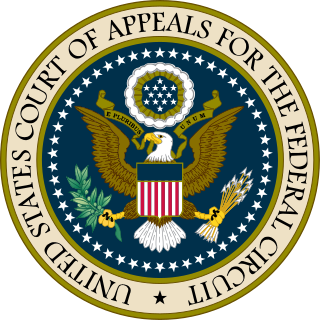J. Edgar Sexton (born October 28, 1936) is a former judge of the Canadian Federal Court of Appeal. [1]
J. Edgar Sexton (born October 28, 1936) is a former judge of the Canadian Federal Court of Appeal. [1]
In the United States, a state supreme court is the highest court in the state judiciary of a U.S. state. On matters of state law, the judgment of a state supreme court is considered final and binding in both state and federal courts.

The United States courts of appeals are the intermediate appellate courts of the United States federal judiciary. The courts are divided into 11 numbered multi-state circuits that each hear appeals from the U.S. district courts within their borders, the D.C. Circuit that only hears appeals from the U.S. District Court for the District of Columbia, and the Federal Circuit that hears appeals from specialized trial courts, primarily the United States Court of International Trade and the United States Court of Federal Claims, as well as appeals from the district courts in patent cases and certain other specialized matters. Appeals from the circuit courts are taken to the Supreme Court of the United States.

The United States district courts are the trial courts of the U.S. federal judiciary. There is one district court for each federal judicial district, which each cover one U.S. state or, in some cases, a portion of a state. Each district court has at least one courthouse, and many districts have more than one. District courts' decisions are appealed to the U.S. court of appeals for the circuit in which they reside, except for certain specialized cases that are appealed to the U.S. Court of Appeals for the Federal Circuit or directly to the U.S. Supreme Court.

The United States Court of Appeals for the Ninth Circuit is a federal court of appeals that has appellate jurisdiction over the U.S. district courts in the following federal judicial districts:

The United States Court of Appeals for the First Circuit is a federal court with appellate jurisdiction over the district courts in the following districts:

The United States Court of Appeals for the Fifth Circuit is a federal court with appellate jurisdiction over the district courts in the following federal judicial districts:

The United States Court of Appeals for the Seventh Circuit is the U.S. federal court with appellate jurisdiction over the courts in the following districts:

The United States Court of Appeals for the Tenth Circuit is a federal court with appellate jurisdiction over the district courts in the following districts:

The United States Court of Appeals for the Eleventh Circuit is a federal court with appellate jurisdiction over the district courts in the following districts:

The United States Court of Appeals for the District of Columbia Circuit is one of the thirteen United States Courts of Appeals. It has the smallest geographical jurisdiction of any of the U.S. federal appellate courts, and covers only one district court: the U.S. District Court for the District of Columbia. It meets at the E. Barrett Prettyman United States Courthouse, near Judiciary Square, Washington, D.C.
In the United States, the title of federal judge means a judge nominated by the president of the United States and confirmed by the United States Senate pursuant to the Appointments Clause in Article II of the United States Constitution.

Judiciary of Malaysia is largely centralised despite Malaysia's federal constitution, heavily influenced by the English common law, as well as Islamic jurisprudence.
The court system of Canada forms the judicial branch of government, formally known as "The Queen on the Bench", which interprets the law and is made up of many courts differing in levels of legal superiority and separated by jurisdiction. Some of the courts are federal in nature, while others are provincial or territorial.

The United States Court of Appeals for the Federal Circuit is a United States court of appeals that has special appellate jurisdiction over certain types of specialized cases in the U.S. federal court system. It has exclusive appellate jurisdiction over all U.S. federal cases involving patents, trademarks, government contracts, veterans' benefits, public safety officers' benefits, federal employees' benefits, and various other categories. Unlike other federal courts, the Federal Circuit has no jurisdiction over cases involving criminal, bankruptcy, immigration, or U.S. state law.
The Federal Court of Appeal is a Canadian appellate court that hears cases concerning federal matters.
The federal judiciary of the United States is one of the three branches of the federal government of the United States organized under the United States Constitution and laws of the federal government. Article III of the Constitution requires the establishment of a Supreme Court and permits the Congress to create other federal courts and place limitations on their jurisdiction. Article III states that federal judges are appointed by the president with the consent of the Senate to serve until they resign, are impeached and convicted, or die.

The judiciary of Australia comprises judges who sit in federal courts and courts of the States and Territories of Australia. The High Court of Australia sits at the apex of the Australian court hierarchy as the ultimate court of appeal on matters of both federal and State law.